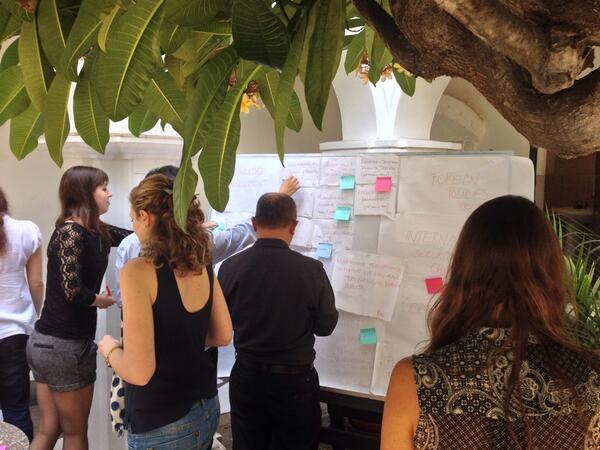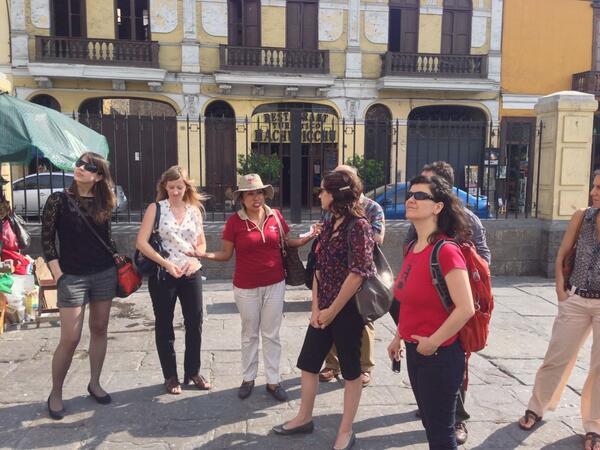Day two of The Exchange focused on the collaborative projects (note that I am not referring to them as ‘collaborative research projects’ -more on this later).
The day began with a presentation of a possible ‘design schedule’ for the projects. We, the organisers, proposed the following:
Collaborative Research Proposals – First Thoughts
- Who
- What
- Why
- Where
- When
Applies to both the selection process and to your proposals themselves and not necessarily in that order
Selection Process
- Where:
- Submit to us (Eva, who will confirm receipt and coordinate the process)
- Selection process – we may commission peer reviews for topics outside our expertise
- Based on these reviews, Enrique Mendizabal and Stephen Yeo make a short list which will be discussed by them and the funders (similar process to the selection of the participants in the exchange)
- Why:
- For budgeting reasons we need to complete the selection process by the end of August (as was explained yesterday)
- Who can apply:
- The people in this room obviously
- Can they apply with a partner who is not in the room?
- What:
- Topic can be either a substantive policy issue or an organizational performance issue
- When:
- 2 page concept note by 1 June with topic, institutions and partners involved, outline of deliverables and schedule:
- We need this to line up peer reviewers and keep to the schedule
- Full proposal by 30 June
- Decisions by 1 August
- Contracting complete by 15 September
- Projects can commence when contracting complete
- 2 page concept note by 1 June with topic, institutions and partners involved, outline of deliverables and schedule:
- How will be support you during the selection process?
- Webinars with potential partners – we can organize and participate
- Informal ad hoc consultations while you are deciding on a partner and writing the concept note and proposal
- Instead of the June exchange, we are considering bringing potential collaborators together in Europe and or Latin America in face to face meetings facilitated by Enrique and or Stephen
- How will be support you after the collaborative project begins?
- October 2014 Exchange:
- Present and discuss the research and the progress they have made
- Pressure on you to work on the project (the shame factor)
- April 2015 Exchange
- Present initial research findings
- October 2014 Exchange:
The participants then used this to come up with some questions that we (all) tried to answer:
- How much time do we have for the whole project?
By July 2015 (10-12 months)
- What kind of project do you expect us to produce? What outputs?
This is flexible
- Can we share part of the applications proposals?
Yes. We can do that ASAP.
- Will applications be accepted?
We hope so, but it is not guaranteed and may require work
- Up to how many partners will you accept in a group?
2 is the minimum… 10 is the maximum?
- How about “extra” partners?
If they can cover their cost then it is possible.
They could come in as a no-cost partner
You could share your grant
You could use partners from your own country (or your partners´)
- What is the size of the grant?
About $8000 per person. These are small grants intended to provide a support to the participants.
- Are detailed budgets required in the concept note?
Not for the concept note.
- What is the difference of a policy issue and organisational development issue?
Organisational development issue may refer to challenges that the organisations face and want to resolve.
- Do you prefer more research, advocacy or monitoring?
It will depend on the partnership you develop. In fact, the projects could be about research or learning, too. The think tanks could work together to implement something in their organisation.
- How do we make sure that both organisations win from the collaboration (with organisational development issues)?
“That is your problem… “ except we will comment.
- Can one organisation send more than one proposal (e.g. with one partner on a policy issue and with another on an organisational development issue)?
In principle, yes. But must be realistic.
- What about collaborating or engaging ”about think tanks”? (A public good proposal)
Interesting one, probably yes. Why not but they would need to address a sustainability issue (for the public good).
- Can we involve other (more senior) staff in the collaboration as a way of providing support?
Yes, but within the budget.
- Should we have more multilateral meetings or bilateral meetings?
Of course, we want to have more multilateral meetings. The June alternative is more ad-hoc and one-off.
Matchmaking 1 (there will be matchmaking Thursday and Friday, too)
This conversation led to a discussion about what the projects would be about. Rightly concerned, the participants felt that they needed additional help to find the right match from among the members of the group.
A new session was developed to address this. In a similar way as a matchmaking site, each participant wrote down the policy and organisational development issues that they are interested in. Then, they went around with “post its” to show an interest in each topic.

There were clearer matches on organisational development issues:
- Think tank funding models and fundraising strategies
- Communications, publications, and influence
- Measuring the performance of think tanks
There were also some policy issues on which a few participants showed interest:
- Transparency of public spending
- Policies to deal with diversity -e.g. through education
- Improving the quality of public policy via decentralisation and public participation
- Promoting village development
They offer an opportunity to start working on deepening our understanding of what each of them involve (questions, theories, etc) and what may be most appropriate to do together (research, action, learning, training, etc.).
—-
During the afternoon, we all went on a city tour of Lima to learn more about the city in which our hosts, IEP, works. The tour, and dinner later, offered us an opportunity to continue to learn about each other. I for one learned that Indonesians do not actually have surnames, Georgians do not call their country Georgia (it is called: Sakartvelo), and that the Georgian language is one of the only 14 alphabets in the world.

Follow The Exchange via #TheExchangeLima


 Previous
Previous
